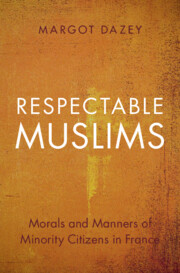Book contents
- Respectable Muslims
- Cambridge Studies in Social Theory, Religion, and Politics
- Respectable Muslims
- Copyright page
- Contents
- Acknowledgments
- Note on Transliterations and Translations
- 1 The (Un)Making of Respectability
- 2 Proving Frenchness
- 3 Allaying Suspicions
- 4 Keeping Order
- 5 Practicing Discreetly
- 6 Uplifting the Community
- 7 Facing Hostility Graciously
- 8 Respectable Citizens in Uncertain Environments
- Bibliography
- Index
8 - Respectable Citizens in Uncertain Environments
Published online by Cambridge University Press: 18 December 2024
- Respectable Muslims
- Cambridge Studies in Social Theory, Religion, and Politics
- Respectable Muslims
- Copyright page
- Contents
- Acknowledgments
- Note on Transliterations and Translations
- 1 The (Un)Making of Respectability
- 2 Proving Frenchness
- 3 Allaying Suspicions
- 4 Keeping Order
- 5 Practicing Discreetly
- 6 Uplifting the Community
- 7 Facing Hostility Graciously
- 8 Respectable Citizens in Uncertain Environments
- Bibliography
- Index
Summary
The final chapter of this book teases out the empirical and theoretical threads of respectability politics in the French Muslim context. It stresses the ways in which this form of politics operates as a reactive, embodied, gendered, racialized, and class-layered tactic of community advancement, resulting in both conservative and emancipatory outcomes for minority citizens. It further reflects on the relative failure of respectability politics, which falls short of its promise to French Muslims to fully exercise their citizenship. This argument goes beyond the French case; although the problematic relationship between religion and citizenship is often deemed “typically French,” respectability politics seems to be pervasive in Muslim-minority contexts and accompanies the reconfiguration of Islamic traditions into ethical projects of self-fashioning. The chapter concludes with a discussion on the importance of breaking away from the insularity of Islamic scholarship and opening up a transatlantic conversation about the role of ethics and religion in minority politics. The ambition of this chapter, then, is to look beyond the Muslim case and draw parallels with other minority citizens, such as Black elites in the US and European Jews. It examines how these groups have resorted to inconspicuous religiosity and social upliftment to advance their conditions, as well as how such stories reflect the intricate workings of power in situations of subjection.
Keywords
- Type
- Chapter
- Information
- Respectable MuslimsMorals and Manners of Minority Citizens in France, pp. 209 - 236Publisher: Cambridge University PressPrint publication year: 2024

